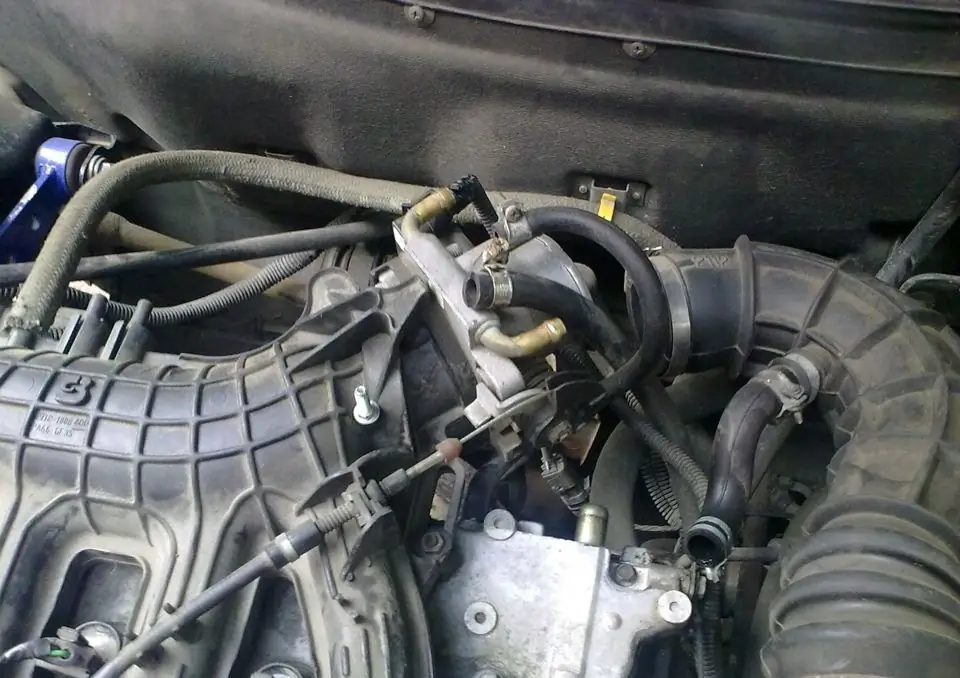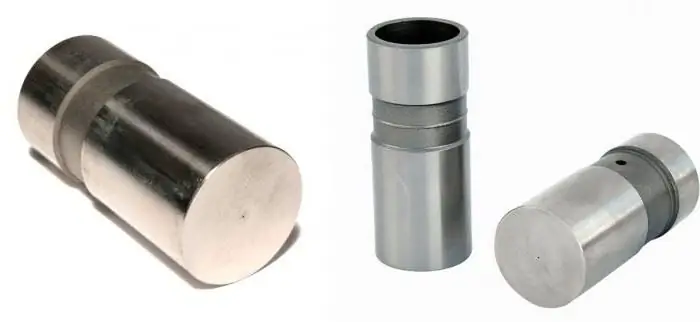2026 Author: Erin Ralphs | [email protected]. Last modified: 2025-01-22 21:14:17
During the operation of the engine, each of the parts heats up. It is known from the laws of physics that with an increase in temperature, any materials, including metal, expand. When the parts in the engine heat up, their dimensions change. AvtoVAZ engineers took into account these thermal expansions when creating the engine. To prevent the engine from failing, they equipped the VAZ-2112 engine with hydraulic lifters.
What is this?
The part is a small hydraulic device. It automatically eliminates the effects of linear expansion in the valve train mechanism during engine operation when the parts expand.

Adjustment of gaps is carried out due to oil pressure in the engine. The clearance is adjusted between the valve and the camshaft. With the help of such compensation of thermal gaps, the engine does not lose in dynamic characteristics, fuel consumptionoptimal after warming up. Also, due to the presence of hydraulic compensators in the VAZ-2112, the engine runs quieter than similar motors with a mechanical valve adjustment system.
How did they come about?
The hydraulic compensator on VAZ vehicles has replaced the inefficient mechanical adjustments of the timing mechanism. Often a conventional valve on classic VAZ engines is not equipped with a compensator. Therefore, drivers adjusted valve clearances every 10 thousand kilometers. The work had to be done manually. The valve cover was removed, measurements were taken with a feeler gauge and the desired gap was set.
If the driver did not adjust the valves, then the engine was accompanied by a lot of noise, the dynamics were lost, and fuel consumption increased. After about 50 thousand kilometers, the valves required replacement, as they were heavily worn. As an alternative to mechanical adjustment, AvtoVAZ decided to offer a more modernized design.
On motors for front-wheel drive cars, special pushers were installed in front of the valve. A “hat” was put on the valve. The diameter of the pusher is large enough, and due to this, wear has decreased. It takes longer for the larger diameter to wear out. Yes, the wear rate has decreased, but the need to adjust the valves remains, although now it had to be done less often.
Usually, the adjustment consisted in placing adjusting washers, which reduced or increased the height of the pusher. Such an adjustment, despite being archaic, is quite effective, and some automakers usethis way to this day. Adjusting the valve clearances in such a mechanism is necessary once every 50 thousand kilometers. On some foreign cars, pushers are able to live even longer.
Among the advantages of such a solution are the simplicity of design, the absence of requirements for oil - even mineral oil will do. In addition, the construction turned out to be very cheap. Among the minuses, reviews note that if the puck works, then the engine becomes noisy, fuel consumption increases, and dynamics drops. AvtoVAZ thought about a design that would automatically regulate thermal gaps in the valve mechanism.

And now, instead of mechanical adjustments, VAZ-2112 hydraulic lifters appeared. At that time it was a completely new technology. In fact, everything is very simple - the driver no longer needs to manually adjust the gaps. The hydraulic lifters will automatically select the correct setting for each valve.
Device
The VAZ-2112 hydraulic compensator is a plunger mechanism. Inside the metal case there is a plunger valve, a ball, a spring. Also inside the element there is a channel for the passage of oil. If we consider the principle of operation, then the device can be understood better.

Working principle
The hydraulic compensator is an intermediate part between the valve and the camshaft cam. When the cam does not exert pressure on the compensator, the valve is closed by the action of the cylinder head spring. Inside, the spring presses on the parts of the plunger pair. Due to this, the body of the compensator moves towards the camshaft cam until it completely abuts against it. In this case, the gap will be minimal.
The required pressure inside the plunger pair is due to oil pressure. It is fed through the channels in the cylinder head and then passes through the holes in the compensator. Then inside it bends the valve and creates the right pressure.
Further, the cam goes down and presses on the compensator. The oil inside the plunger presses on the valve and closes it. The compensator turns into a rigid element, which, under the pressure of the cam, opens the valve of the timing mechanism.
It must be said that the hydraulic lifters on the VAZ-2112 (16 valves) are quite highly efficient devices. Oil is squeezed out of the plunger before the ball closes. So, a very slight gap can form, which will go away with the next oil supply. The compensator will become stiff again.

No matter how hot the engine is, the gap will always be the best. The mechanism does not require adjustments during the entire service life. Even if there is wear, no adjustment is needed. The compensator is always pressed against the camshaft.
Problems
Among the problems with hydraulic lifters, owners highlight their knock. He says that these elements do not work as intended. Also, knocking may indicate problems with the engine lubrication system. Let's look at why the hydraulic lifters on the VAZ-2112 are knocking.

Causes of sound
One of the biggest reasons has to do with the quality and level of engine oil. So, most often a knock is heard due to an insufficient level. Oil inefficiently enters the oil channels and does not enter the plunger pair. As a result, there is no necessary pressure in the hydraulic compensator for its full operation.
Oil channels in the cylinder head or in the compensator itself may also be clogged. This happens due to an untimely oil change. It burns out, and soot forms on the walls of the mechanism. The latter can clog the channels of the lubrication system. Oil does not have the ability to effectively enter the hydraulic compensator.
Mechanical problems can also be identified. Most often, the hydraulic compensator on the VAZ-2112 (16 valves) knocks due to the failure of the plunger pair - these elements are jammed. There will be a knock if the ball valve in the plunger is out of order. The sound can also speak of soot on the outer part of the plunger body. It prevents the mechanism from moving and adjusting the gap automatically.
How to solve the problem?
The most effective solution is to replace hydraulic lifters with VAZ-2112. But if soot has formed in the system, then these mechanisms are removed and washed. After washing, it is sometimes possible to restore their performance. However, if the mileage of the car is large, then the compensator breaks and then it is definitely only to be replaced.

The quality of the mechanism largely depends on what kind of oil is poured into the engine and how often it is changed. For quiet andFor reliable operation of the mechanism for automatic compensation of thermal gaps, it is necessary to fill in high-quality synthetic oil and change it regularly. Then the elements will last longer. Sometimes a lower viscosity oil may be needed to pressurize the system.
Conclusion
Hydraulic compensators on the VAZ-2112 (16 valves) relieve the driver of the need to adjust the clearances, and this is a great advantage of these engines. With proper engine care, there will be no problems with compensators.
Recommended:
Starter VAZ-2105: problems and solutions, replacement and repair rules, expert advice

VAZ-2105 is still popular with Russian drivers. It is distinguished by ease of operation and low cost of spare parts. However, if the car owner wants the car to work without problems, he must regularly check it for various faults
Throttle valve on the "Prior": where is it located, purpose, possible problems and repairs

It often happens that the car engine runs intermittently, despite the fact that the on-board computer does not give errors. The fuel supply pressure is normal, the sensors are intact, and the idle speed jumps from 550 to 1100. If a similar problem occurred on the Prior, then the cause may be hiding in a throttle valve malfunction
The engine starts and stalls: possible causes and solutions

With scheduled maintenance, all impending vehicle breakdowns can be eliminated. However, it also happens that a part breakage can occur suddenly
Hydraulic compensator - what is it? Knock of hydraulic lifters: causes, repair

Modern cars are equipped with a device such as a hydraulic compensator. What is this node? How does he work? All this and more - further in our article
The hydraulic compensator knocks on the cold. Knock of hydraulic lifters on a cold engine

Every motorist, when operating a vehicle, will certainly listen to how his car works. The appearance of extraneous noise in the operation of the engine, as a rule, does not bring joy to the owner. The presence of the slightest malfunction requires urgent diagnostics and troubleshooting

